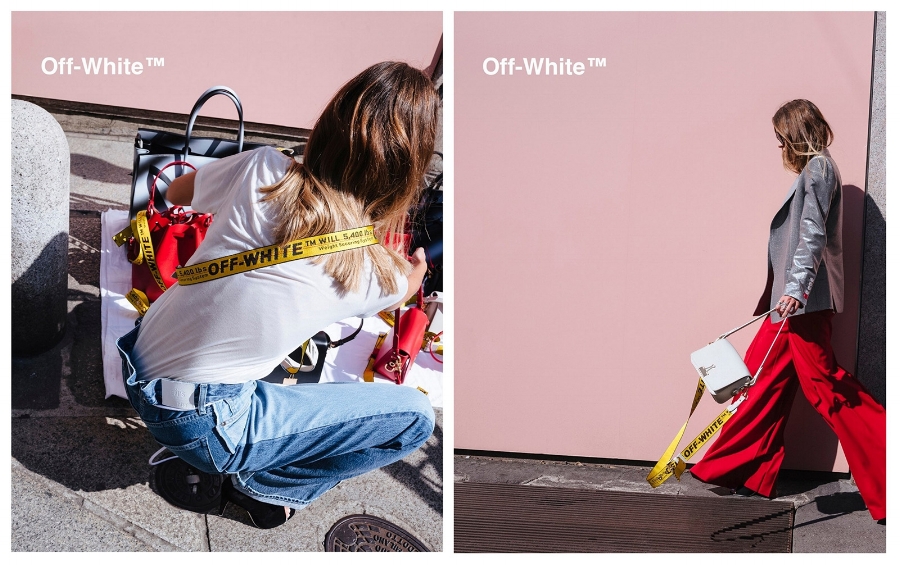
image: Off-White
Off-White depicted a Canal Street-like set up in one of its most recent ad campaigns, shedding an artful light on one of the age-old problems facing fashion brands. The physical sale of counterfeit goods is very much alive and well, both in the U.S. and on an international scale – whether it be at flea markets or on street corners – but it is no longer the most pressing form of counterfeit sales for brands in the digital age.
Internet marketplaces, like Alibaba and Amazon, are consistently saturated with bags and garments bearing counterfeit designer logos. This has been well-documented in the countless lawsuits that luxury and high fashion brands, including Hermès, Chanel, Gucci, and Louis Vuitton, have filed against individual marketplace sellers. Louis Vuitton was one of the first to take this approach – filing suit against individual sellers, as opposed to the main marketplace sites, themselves – in July 2013, when it filed a trademark infringement suit against individual iOffer users.
But in addition to these instances, brands are also fighting against amplified efforts by counterfeit sellers to secure urls bearing their names (seeking to offer the appearance of legitimacy to their operations). In fact, a handful of fashion’s most renowned fashion houses are increasingly being targeted by cybersquatters, according to a new report from DomainTools, a Seattle-based firm that specializes in domain name and DNS-based cyber threat intelligence.
DomainTools found that Amazon, Apple, Gap, Nike, and Walmart are all subject to extensive cybersquatting efforts – the registering, selling or using a domain name with the intent of profiting from the goodwill of another’s trademark – with multiple malicious domains bearing their trademarks being created each day.
Another group of companies consistently being targeted by cybersquatters: Luxury and high fashion labels. According to DomainTools’ report – which specifically looked to gauge the frequency with which squatters are making use of Cartier, Givenchy, Louis Vuitton, Burberry, Hermès, Chanel, Prada and Gucci’s trademarks – 538 domains were identified as “high risk.” These domains, such as giivenchy.com, louisvuiitton.us burberryyuk.com, chamel.us, louisvitton.com, and cartierwatches.me, often make use of small typos that are easy to miss when quickly scanned by the average consumer.
In addition to merely serving as the home of sites designed to hawk counterfeit goods, DomainTools found that these domains are also being used in phishing email campaigns and various other kinds of scams, including pay-per-click ads, for-profit survey sites and social media scams to trick customers into handing over personal details and money for a product.
Phishing – the practice of sending emails purporting to be from reputable companies to induce individuals to reveal personal information, such as passwords and credit card numbers – is also on the rise, with retail being one of the most frequently targeted sectors. A recent report by Symantec, an American software company, entitled, “Internet Security Threat,” detailed the state of threats across an array of industries, noting that retail was the industry sector most heavily exposed to email phishing attacks in 2015, with more than one percent of all emails classified as malicious.
“The ease of creating a domain is a never-ending nuisance for brands that have to monitor for domain squatters. The bigger and more lucrative your brand, the more of a target you become for cyber criminals,” said Tim Helming, Director, Product Management at DomainTools.
“Many companies tackle this by proactively buying domain names that are similar to their own name. It’s a relatively cheap insurance policy to keep pesky cybersquatters from benefiting by appropriating your brand and helps to keep consumers safe, too,” he further noted.
As for how high fashion and luxury goods consumers can avoid becoming targets of these ever-increasing efforts, Helming offers at least one piece of advice: “If something seems too good to be true, it likely is.” In order words, that heavily discounted Louis Vuitton bag is fake.







